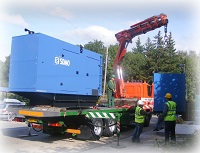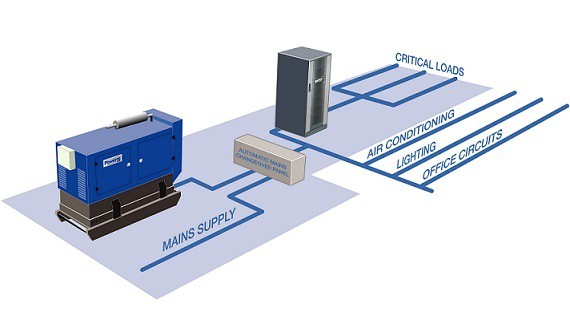Today, a typical organisation’s performance is only as good as its ICT resource – which depends in turn on the quality and continuity of its power supply. Accordingly, data centre facilities of all sizes invariably protect their data processing and communications equipment with UPS systems. These provide power protection from short-term blackouts as well as other mains-born electrical disturbances.
However, simply sourcing an uninterruptible power supply of suitable capacity isn’t necessarily enough to provide appropriate power protection. What happens if an extended blackout of several hours or more occurs? Below, we look at the factors to consider when accurately matching a power backup system to your particular data centre facility’s real needs.
We can start by recognising that power supply issues divide into long-term blackouts of extended duration, or short-term problems such as transients, noise, brownouts and brief-duration blackouts.
Long-term blackouts need special consideration because a UPS system alone is never sufficient to handle them; no matter how much the UPS battery autonomy, a blackout of longer duration is always possible. Some facilities can tolerate this provided they can shut down safely, but most – especially if the system is processing on-line transactions – must continue running under all circumstances.
If the facility is ‘shut-down tolerant’, it can survive with a UPS alone. During short-term blackouts, the UPS installation simply switches its inverter to battery power on detection of utility failure. If power is restored well within the UPS battery autonomy, the inverter is switched back to the incoming mains power supply. The load has enjoyed uninterrupted operation, with complete power protection from the temporary problem.
However if the blackout period starts to threaten the UPS battery autonomy, the uninterruptible power supply must signal the load. This allows the UPS system to shut down gracefully in the remaining battery time. System hardware and data has been protected from damage, although the organisation loses its ICT resource.
If such power loss is unacceptable, the only solution comprises a UPS power supply in combination with a backup generator system, which, with sufficient fuel, can outlast any blackout.
Such generator-UPS system combinations need reliable communications between the standby generator, UPS and critical load, as well as a suitable control system on the generator. During short-duration blackouts, the uninterruptible power supply uses its battery power to avoid unnecessary standby generator start-ups. If a blackout becomes extended, though, the UPS system signals the backup generator, through an Automatic Mains Failure (AMF) panel, to start up. The UPS battery autonomy allows the standby generator to reach full speed and synchronise its voltage output with the uninterruptible power supply, while interrupting the load’s power. Once the backup generator is on line, the UPS installation uses its power to feed the load and recharge its batteries.
When uninterruptible power supplies detect mains power restoration, they delay, typically for at least two minutes, before switching back to the mains power supply. This ensures that the power supply is sustained rather than, say, a temporary utility company fault location procedure.
The standby generator itself must be adequately prepared to perform successfully as a backup power component. It should have an electronic governor to regulate engine speed and therefore the alternator output frequency, to ensure sufficiently fast response and accuracy. Mechanical governors are lower-cost, but lack the responsiveness, accuracy and stability needed by the UPS solution and critical load.
If the backup generator’s output frequency is outside the UPS’s critical limits or is changing (slewing) too fast, the UPS power supply will not synchronise. It will also generate a warning that if a fault occurs the load will not transfer from the UPS system to the raw generator supply.
To avoid such power protection problems, it’s important to inform the generator supplier that their equipment is intended for use with a UPS solution, and ensure that it’s designed and tested accordingly. As one of the leading UK uninterruptible power supply manufacturers we can advise on standby generator and UPS system pairings suitable for any application.
For more information about our backup generators or our UPS services please contact us on 0800 731 3269 or email [email protected].






